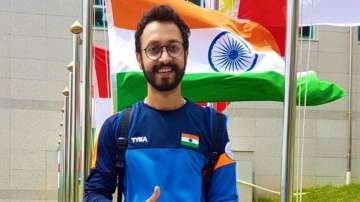It is not easy to maintain focus when there is nothing to look forward to in the near future, but pistol shooter Abhishek Verma is doing everything he can from learning German to picking up his guitar in a bid to ensure his mental health remains in a good place.
The COVID-19 pandemic has brought the world to a standstill with Tokyo Olympics getting postponed by a year. The International Shooting Sport Federation (ISSF) has also cancelled all its tournaments this year.
"It is difficult to stay strong mentally at this time. But meditation, yoga is helping me. If we are mentally strong and take care of the mental health, we can recover faster after things get normal," two-time World Cup gold medallist Verma told IANS on Tuesday from Chandigarh.
Verma, who had secured an Olympic quota place by winning the 10m air pistol gold medal at the Beijing World Cup in April last year, said he has started learning German online as it not only keeps him occupied but also sharpens the mind which is so important in a sport like shooting.
"I do dry training for two hours. I draw also. Besides that, I am learning German on YouTube. I started during lockdown. I always wanted to learn a foreign language. It makes the mind sharper. We also keep going to Germany so it will help there also," said the 30-year old.
Verma further said he used to play the guitar in high school, but never continued. This period of lull has given him an opportunity to pick up the instrument again.
"I exercise in the evening. I have stretching bands at home, balancing pole. Also, when I was in class 12, I had learned to play the guitar. But after that it was not used. Now I have started playing again. I play ludo also online with my cousins."
Verma added he used to stay away from social media and his mobile phone when he was preparing for the Olympics. Now with little to do at home all day, the distraction is there but he tries to divert his mind as much as possible.
"I keep myself busy by learning German as I told you, then playing the guitar and doing exercises and dry training. I also talk to friends and teammates."
Asked how difficult will it be to get back to training when things get normal, Verma said there has to be a plan of what to do when there is no competition around and the ones who accept this period mentally will be able to come out stronger.
"Mentally like we used to train, we had a goal with Olympics around. Now we have one years' time (for the Olympics) and there is no competition in 2020. When we will start practice after lockdown, we need to know what we need to do for this one year.
"If we are not getting competition, and we are only training focus can be lost. Then there will be a problem. So I am working on the mental side a lot so that focus is not lost. See physically and technically we are anyway strong.
"We live in a virtual world at times. So meditation helps me keep in the real world. We need to accept the situation and move ahead. We have to start from zero now. We need to accept that also. If we don't and keep sulking, it will affect us.
"When things get better, it will go down to who recovers faster and gets back to the level where they were prior to all this.
"We need to have a plan. Then I think everything will be fine. If we don't have a plan, it will be difficult," concluded Verma who topped the podium at the Rio World Cup in August-September.

